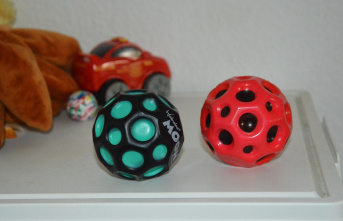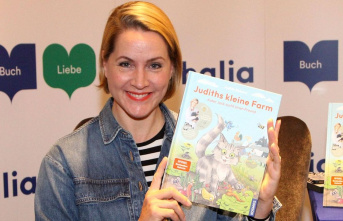Volker Masuhr is in addition to the disinfectant dispenser and left surprisingly. Every Morning, the school principal ensures that 74 elementary school students Line up in the yard of the forest school in Flensburg. Then disinfect one by one the hands. Cones make sure that the children keep a distance. Masuhr monitors the procedure. Only then will you be allowed to enter the class room. It is a reboot in a changed world.
The return in the primary is consuming. The 74 fourth graders were the First who were allowed to return. Every day for two hours and never more than nine people in a room. In a type-shift operation from 18 to. May may again, almost all of the 400 children in the school. The disadvantages it brings. "In terms of content, we have to make compromises," says Masuhr.
For nearly 15 years, he leads the Northern Germany's flagship school. The concept: children from all Educational backgrounds are learning together and support each other. Thus, the 64-Year-old, the most important education won prizes that you can win in Germany - including the Jakob Muth-prize for inclusive schools and the German school award. However, the corona pandemic brings self-Masuhr and its forest school boundaries. The stripped-down curricula might be the smallest Problem.
Serious consequences for the formation of the RepublicThe school principal must now face the knowledge gaps left by the Learning at home. Although children from educated families were comparatively well with the Situation, as observed by the head teacher. "The most work to do at home to be disciplined with your tasks." But the further from education, it often looks different. There are families without a Computer or email addresses. And hence no learning success. In the case of particularly difficult cases, the teacher had driven himself over. Not all of the families opened the door for you.
education experts, such as Ludger Wößmann from the Leibniz Institute for economic research in Munich, represented the view that the school lock down has serious consequences for the educational Republic of Germany. Because many students learned for the past two months, little to nothing. Maybe the fabric will learned just repeats instead of new. The knowledge gaps in the damage, according to the critics, not only the children, but also of the economy. While the policies discussed emergency aid for industry and trade, forgot your most important resource. The result - an educational time-bomb? FOCUS Online provides you with the most exciting Reports from the parents. Here you can subscribe to the Newsletter.
Andreas Schleicher is one of the best-known educational researchers in the world. The mathematician derives the area of education, the organization for economic cooperation and development. Its Pisa study is the largest of its kind, more than 70 Nations car every three years, a performance test. The critical analysis will not please everyone, however, self-Pisa-opponents can't deny that the Test has a major influence.
"crisis is something of a Pisa-Test""This is a crisis," says Schleicher, "is basically something like a Pisa Test." Countries such as South Korea or the city-state of Singapore, the use of the digital classroom of long ago, of course, would have great advantages. You could catch up the fabric faster, the systems quickly back up. In Singapore, one has to consider even in the future, solid Online education days to introduce.
And Germany? Well, says Mr Schleicher. Germany is lagging behind in technical equipment far. In addition, more than half of the teachers according to the evaluation of the headmaster is not on the digitisation prepared. "Germany needs to double its efforts in the area of teacher training", calls Schleicher. Only the necessary technical concepts in the pedagogical everyday life to integrate. "That since then Computer stand, it is not enough for an innovative learning environment. The teachers need to know to deal with it. There's enormous potential lies fallow.“
And yet something had shown Corona: That social and emotional competence in everyday school life played an important role, says Mr Schleicher. He therefore plans to include this measure in the next Pisa study for the first time, these skills. "In this new module focuses on the relationship between teachers, students and school - and how this has changed through the Corona of a crisis."
notes via Push messageeducation economist Wößmann shows himself sceptical about the limitation of the current damage. "I think we're beyond the point where you could absorb the knowledge gaps and their consequences fully." Together with around 90 researchers - colleagues, he appealed in a Letter ("education!") to the policy. The claim: schools are gradually re-open. And the quickly.
Wößmanns a hurry for a reason. "With each year of school and the relevant competence acquisition of students achieve later, even a ten percent higher income for life," says the scientist. This bill around functioning but also different. "Now, when a third of the school year, eliminated simply, it means for the students three to four percent less of lifetime earnings." If so, no frontal teaching was not possible, then at least distance models should work, calls Wößmann.
what that might look Like, you only have to look to Estonia. The country on the border with Russia is paving the way in terms of digitization. For years, the children learn in the primary school programming languages. Estonia was in the most recent Pisa-studies repeatedly place among the Europeans and replaced Finland as the model student.
is one of the fathers of this success Taavi Kotka. The IT engineer lives in a modern Villa on the outskirts of Tallinn and answered questions via video chat, while his children do homework.
Kotka is considered as one of the inventors of e-Estonia, the consistent digitisation of Estonia in all areas of life. 18 years ago, he developed the platform to "eKool", with the help of teachers, students and parents about all the learning processes of exchange. The notes of his children, he receives via Push message on their Smartphone. Cheating is no longer there. "Education is understood in Estonia as Teamwork," says Kotka.
Only the plaster man with maskThe Estonian secret to success is simple: "It tells the way how we think, how we understand education," the 41-Year-old. Just as the great common task of a country with just 1.3 million inhabitants, whose high education level is the best and perhaps only resource.
But what do parents make the effort to support children's Learning, or can't afford a Computer? This, says Kotka, was not a Problem. Schools collected possibly money, so that all children can be equipped with computers. And the supervision of homework will be delegated, in exceptional cases, to the schools. Thanks to these inputs Estonia can allow it to begin again in September with the regular operation of the school.
another way Denmark is going. Similar to the Bay of the forest school, on the Copenhagen Sankt Petri school, the elementary school students, who were first back to school. Just three weeks earlier. In the layer, especially the core subjects of Danish, English, math, and English are taught for operation. "There is only one Person with a protective mask," says the acting head teacher Mogens Kristensen, "our cleaning man." Not out of fear of the Virus, but because of the fumes of the disinfectant.
children make up only three percent of the Infected fromOtherwise, a fairly normal operation is possible. The tables are to be set apart more, the classes are smaller. "Our impression is that it's going well," says Kristensen. "The groups now have only nine to twelve students. As a result, the teaching is very intensive.“ The school is operating safely? "We are now in the fourth week since re-opening with 400 children, and we have zero Corona cases at the school."
Such messages encourage critics who complain of the openings of the sluggish School in Germany - because it is not clear whether children play in the spread of the Virus is a big role. In Germany, they make up only around three percent of the confirmed Infected. A team of researchers led by the University of Mannheim is now to clarify the question of Transfer.
14 collect hospitals blood samples of children are tested on Covid-19 antibody. According to observations in the Netherlands, the Virus is carried mainly by adults in the families, not by children.
Sven Sindt for FOCUS magazine, Jürgen Heinrich/imago
See you in the PCP you can See in the
Date Of Update: 24 May 2020, 05:26










